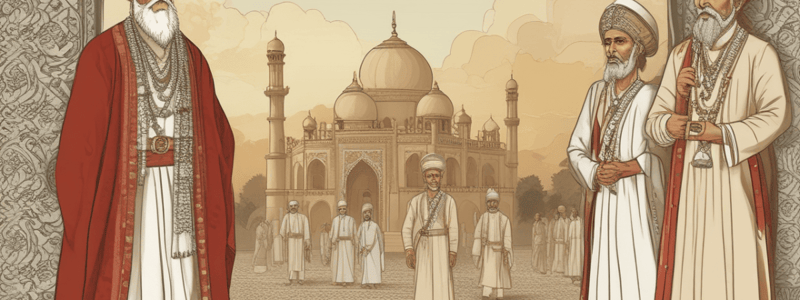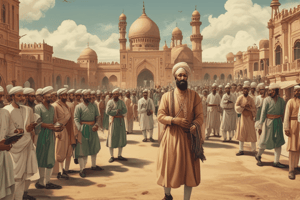Podcast
Questions and Answers
What was one of the main reasons behind the British government's decision to revoke the partition of Bengal in 1911?
What was one of the main reasons behind the British government's decision to revoke the partition of Bengal in 1911?
- Because of the economic losses faced by the British
- To appease the Muslim community
- Due to the strong support from the Hindu community
- To avoid trouble during the visit of King George V (correct)
What was the main objective of the Simla Deputation of 1906?
What was the main objective of the Simla Deputation of 1906?
- To protest against the partition of Bengal
- To present the demands of the Muslim community to the British government (correct)
- To demand independence from British rule
- To establish a separate Muslim nation
What was a key demand of the Simla Deputation of 1906?
What was a key demand of the Simla Deputation of 1906?
- Separation of India into Hindu and Muslim states
- Representation in proportion to their population
- Representation more than their population due to their historical importance (correct)
- Introduction of democratic principles in India
What was the outcome of the Simla Deputation's meeting with the Viceroy?
What was the outcome of the Simla Deputation's meeting with the Viceroy?
What was the significance of the Simla Deputation of 1906?
What was the significance of the Simla Deputation of 1906?
What was the outcome of the partition of Bengal in 1905?
What was the outcome of the partition of Bengal in 1905?
What was the consequence of the War of Independence in 1857 for the Muslim rule in India?
What was the consequence of the War of Independence in 1857 for the Muslim rule in India?
What was the primary goal of the Aligarh movement and the Central Mohammedan Association of Justice Amir Ali Syed?
What was the primary goal of the Aligarh movement and the Central Mohammedan Association of Justice Amir Ali Syed?
What was the outcome of the Hindi-Urdu Controversy?
What was the outcome of the Hindi-Urdu Controversy?
What was the reason behind the formation of the Congress?
What was the reason behind the formation of the Congress?
What was the area covered by United Bengal before the partition of 1905?
What was the area covered by United Bengal before the partition of 1905?
What was the year of the Lucknow Pact?
What was the year of the Lucknow Pact?
What was the primary goal of the Muslim leaders after the meeting of the Mohammedan Educational Conference?
What was the primary goal of the Muslim leaders after the meeting of the Mohammedan Educational Conference?
Who chaired the meeting where the Muslim League was formed?
Who chaired the meeting where the Muslim League was formed?
What was the main objective of the Muslim League, as stated in its constitution?
What was the main objective of the Muslim League, as stated in its constitution?
What led to a major drift in the Muslim League's policy in 1913?
What led to a major drift in the Muslim League's policy in 1913?
What was the outcome of the Lucknow Pact in 1916?
What was the outcome of the Lucknow Pact in 1916?
What was the significance of the Lucknow Pact for Muslims?
What was the significance of the Lucknow Pact for Muslims?
What was the announcement made by the British government on August 20, 1917?
What was the announcement made by the British government on August 20, 1917?
What was the ultimate outcome of the historical struggle of the Muslims in India?
What was the ultimate outcome of the historical struggle of the Muslims in India?
Study Notes
Decline of Muslim Rule in India
- The year 1857 marked the decline of Muslim rule in India, with Muslims and Hindus participating in the War of Independence, but the British holding only Muslims responsible for the rebellion.
Efforts for Revival
- Personalities like Justice Amir Ali Syed and the Aligarh movement emerged to guide the Muslim community in the critical situation.
- Their efforts focused on reviving self-identity and political positioning in Indian society.
Post-War Era
- The post-war era was disastrous for Muslims, with ruthless persecution and lack of support.
- The Indian society was hostile towards Muslims, with the Hindu Revivalist movements targeting them.
Key Events
- Hindi-Urdu Controversy (late 19th century): highlighted the hatred and enmity of the Hindu community towards Muslims.
- Formation of the Congress (late 19th century): a method to incorporate Muslims into Hinduism, popularizing agitational politics.
Events Since the Beginning of 20th Century
- Partition of Bengal (1905): a Muslim-majority province with 13 million out of 31 million people, which was strongly supported by Muslims but opposed by Hindus.
- Annulment of the Partition (1911): the British government revoked the partition to avoid trouble during the visit of King George V.
Simla Deputation (1906)
- The first systematic attempt by Muslims to present their demands to the British government.
- The delegation, led by Sir Agha Khan, emphasized the importance of considering Muslims' historical contributions and separate identity.
- Demands included:
- Representation more than their population due to their importance.
- Separate electorate.
- Reservations of Muslim seats in government jobs.
Formation of the Muslim League (1906)
- The All India Muslim League was formed after the success of the Simla Deputation.
- The League's goals included:
- Protection and promotion of political rights and interests of Muslims.
- Cooperation with other communities without prejudice to the above goal.
- Fostering sense of loyalty among Muslims towards the government.
Change in the Goals of the Muslim League (1913)
- The League changed its goals due to the annulment of the Partition of Bengal and Western aggression towards Muslim countries.
- New goals included:
- Self-government under the British Crown, considering India's peculiar conditions.
- Good relations with other communities and cooperation with any party working for similar goals.
Lucknow Pact (1916)
- A product of Hindu-Muslim unity, led by M.A. Jinnah.
- The pact included:
- One-third seats for Muslims in the Imperial Legislative Council.
- Separate electorate.
- Half members of the Executive Council to be elected by the Imperial Legislative Council.
Gains from Muslim Point-of-view
- Separate electorate.
- One-third Muslim seats in Central Legislature.
- Unofficial bill, if opposed by three-fourth members of a community, it will not be passed.
August 20, 1917 Announcement by British Government
- Secretary of State Montagu promised:
- Greater association of Indians in all branches of government.
- Responsible government.
- Induction of Indians in the commissioned ranks.
Studying That Suits You
Use AI to generate personalized quizzes and flashcards to suit your learning preferences.
Description
This quiz covers the major political developments in India from 1857 to 1918, including the War of Independence and its impact on Muslims and Hindus.




